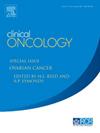Clinical Relevance of Immunohistochemical Subtypes in Early-Stage, Lymph Node-negative Breast Cancer. Results of a Large Cohort Study
IF 3.2
3区 医学
Q2 ONCOLOGY
引用次数: 0
Abstract
Aims
This study aimed to provide the association of immunohistochemical (IHC) subtypes of early-stage, lymph node–negative breast cancer with clinical outcomes. The relevance of adjuvant systemic therapy (AST) with respect to triple-negative cancers was given special attention.
Materials and methods
We used the data of 1,959 breast-conserving therapies (BCTs) in 1,861 women diagnosed with early-stage unilateral, lymph node–negative breast cancer treated between 2004 and 2015.
Results
Overall, IHC subtypes were not associated with disease-specific survival (DSS) or overall survival (OS) in multivariate analyses. Looking at the influence of AST, administered according to current guidelines, we noted that triple-negativity compared to luminal A demonstrated a better DSS (hazard ratio [HR]: 0.4, 95% confidence interval [CI]: 0.1-1.1). For those without AST, outcomes for all subtypes did not differ. Difference in outcome of triple-negative tumours for without and with AST was mainly due the presence of patients bearing histological grade 3 cancers in those without AST.
Conclusion
In early-stage, lymph node–negative breast cancer treated with BCT and AST, according to existing guidelines, triple-negativity demonstrated a better outcome in DSS. However, for those without AST, no differences were seen in outcome between the various subtypes.
免疫组织化学亚型在早期淋巴结阴性乳腺癌中的临床意义一项大型队列研究结果
目的本研究旨在提供早期淋巴结阴性乳腺癌免疫组织化学(IHC)亚型与临床预后的关系。辅助全身治疗(AST)与三阴性癌症的相关性得到了特别的关注。材料和方法我们使用了2004年至2015年期间1861名诊断为早期单侧淋巴结阴性乳腺癌的女性的1959例保乳疗法(bct)的数据。结果总体而言,在多变量分析中,IHC亚型与疾病特异性生存(DSS)或总生存(OS)无关。在观察AST的影响时,我们注意到,与luminal A相比,三阴性AST表现出更好的DSS(风险比[HR]: 0.4, 95%可信区间[CI]: 0.1-1.1)。对于没有AST的患者,所有亚型的结果没有差异。三阴性肿瘤的转归差异主要是由于未AST的患者中存在组织学3级肿瘤。结论在早期,淋巴结阴性乳腺癌接受BCT和AST治疗,根据现有的指南,三阴性患者在DSS中表现出更好的转归。然而,对于那些没有AST的人,不同亚型之间的结果没有差异。
本文章由计算机程序翻译,如有差异,请以英文原文为准。
求助全文
约1分钟内获得全文
求助全文
来源期刊

Clinical oncology
医学-肿瘤学
CiteScore
5.20
自引率
8.80%
发文量
332
审稿时长
40 days
期刊介绍:
Clinical Oncology is an International cancer journal covering all aspects of the clinical management of cancer patients, reflecting a multidisciplinary approach to therapy. Papers, editorials and reviews are published on all types of malignant disease embracing, pathology, diagnosis and treatment, including radiotherapy, chemotherapy, surgery, combined modality treatment and palliative care. Research and review papers covering epidemiology, radiobiology, radiation physics, tumour biology, and immunology are also published, together with letters to the editor, case reports and book reviews.
 求助内容:
求助内容: 应助结果提醒方式:
应助结果提醒方式:


